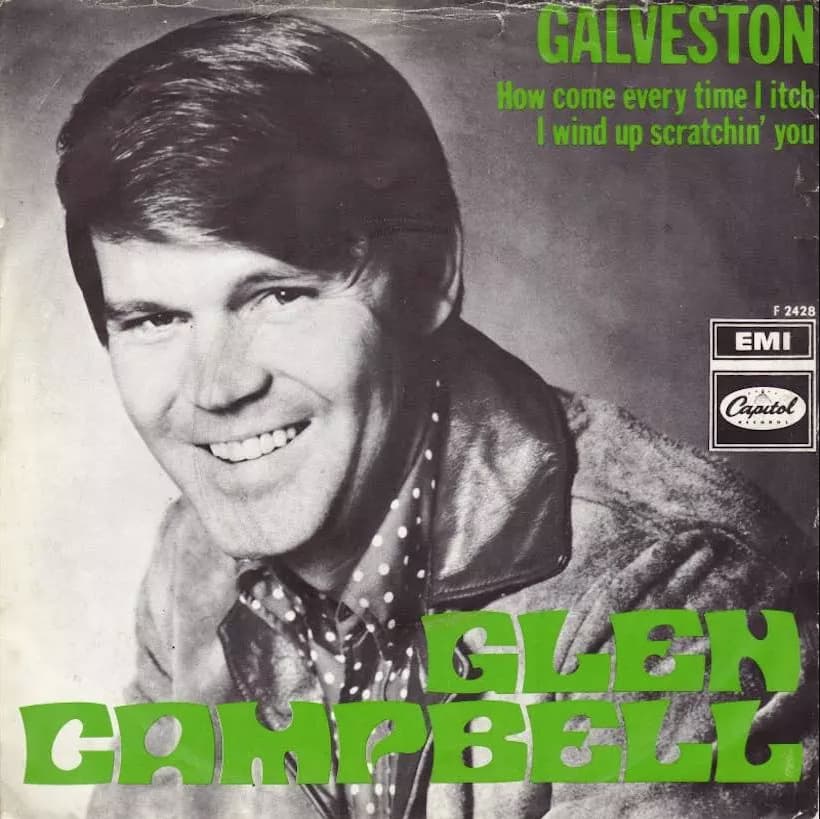
“Galveston” by Glen Campbell: A Reflection of War and Longing
When you think of Glen Campbell, it’s hard not to immediately conjure up the iconic sounds of “Galveston,” a song that has resonated deeply with audiences since its release in 1969. Written by the legendary Jimmy Webb and recorded with the instrumental prowess of The Wrecking Crew, this song is far more than just a piece of music—it’s a narrative that speaks to the heart, exploring the intersection of love, war, and the yearning for home. It’s a song that not only topped the country music charts, but also made its mark across multiple genres, reaching number 4 on the Billboard Hot 100 and clinching the top spot on the Easy Listening charts.
From the moment you hear the opening chords of “Galveston,” there’s a palpable sense of nostalgia that sweeps over you. This isn’t just a song; it’s a story—a soldier’s story. The protagonist, caught in the throes of war, longs for his beloved and his hometown, Galveston, Texas. It’s a powerful image, one that encapsulates the internal conflict of a man far from home, grappling with his reality while his mind drifts back to the simplicity and serenity of a place he holds dear. The song’s lyrical depth is a testament to Webb’s ability to craft stories within songs, making listeners feel every word as if they were the soldier himself.
The song’s origins trace back to Don Ho, who first recorded it in 1968, giving it a mournful tone that highlighted the underlying sorrow of the lyrics. However, it was Glen Campbell’s interpretation that truly brought the song to life. Campbell, who was introduced to the song by Ho himself on The Glen Campbell Goodtime Hour, chose to perform it with an up-tempo rhythm, which, interestingly, lent a new dimension to the song. Some listeners perceived it as a protest against the Vietnam War, but Campbell’s version steered clear of overt political statements. Instead, it focused on the emotional turmoil of a soldier longing to escape the chaos around him and return to a peaceful life in Galveston.
The imagery within the song is both vivid and haunting. Lines like “I still hear your sea waves crashing, while I watch the cannons flashing” juxtapose the peacefulness of the sea with the violence of war, creating a stark contrast that lingers with the listener. In the original verse sung by Don Ho, there’s a direct plea to “put down this gun and go to Galveston,” a line that was softened in Campbell’s rendition but still retained the core sentiment of yearning for an escape from the brutality of battle.
“Galveston” was more than just a commercial success; it became an anthem for a generation grappling with the complexities of war. Its success on the charts—certified gold by the RIAA in October 1969—was a reflection of its widespread impact. Glen Campbell himself, dressed in military-style attire in the promotional video, added a visual layer to the song’s narrative, further embedding it into the cultural consciousness of the time.
In the years since its release, “Galveston” has remained a poignant reminder of the personal costs of war. It’s a song that speaks to anyone who has ever felt the pull of home, especially in times of uncertainty and fear. Glen Campbell’s rendition of “Galveston” doesn’t just tell the story of a soldier; it tells the story of every person who has ever longed for the comfort of a familiar place and the love of someone waiting for them there.